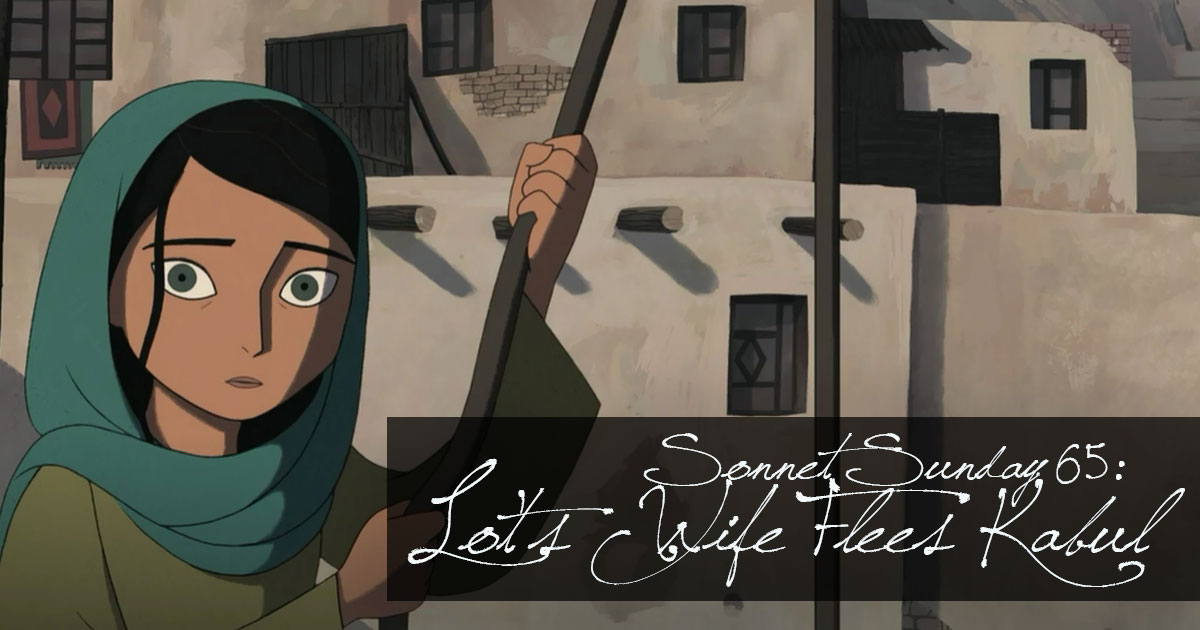Sonnet Sunday 65: Lot’s Wife Flees Kabul

Today’s sonnet is a bit of a cheat; it was actually published (probably coincidentally) on Tuesday, September 11, by Fathom Magazine. If you haven’t already read it, I recommend you read it here before you read the rest of this post.
This is my first not-personally-published poem, excluding a few I published when I was MUCH younger in those pay-to-submit “competitions.” I’ve heard a lot of positive feedback from it, which is nice.
There’s only one problem with it.
It gets the current realities of the political and social climate in Afghanistan completely wrong.
Or so I’m informed by a dear friend, an instructor in the ESL program at Ohio University, who (as she declares) probably knows more Afghans than anyone else who knows me. In fact, just a few weeks ago, several of the visiting Fulbright scholars she was working with were dealing with a bombing in a school in their neighborhood in Kabul.
The problem with the poem, really, is that it lacks its original context. It wasn’t really meant as a commentary on that turmoil. The reality is that it was in response to the juxtaposition of two different stories coming together in my own life. I submitted the poem to Fathom with the post I’m publishing below; they chose to let the poem stand on its own. I didn’t think anything of it until my friend texted me. In the end I don’t think it’s actually that far off. But it could have benefited from an expert eye.
“You’re rueing the day you became friends with someone in international education, aren’t you,” she said.
“Actually, I’m rueing that I didn’t think to send it to you first,” I texted back.
And then I wrote this poem on wanting to edit things after they’re complete:
This is my haiku.
I don’t want to edit it.
Oh, wait, yes I do.
On Warfare and God’s Wrath
It was mid-May by the time I finally sat down to watch The Breadwinner. It had been on my list since I first saw the trailer the previous summer, but even then I knew it wasn’t going to be an easy watch.
And it wasn’t. It was an excellent movie, of course, and well worth watching, but it wasn’t easy. But then injustice and oppression never is.
The movie centers around a young girl named Parvana, who lives with her crippled father in Taliban-controlled Kabul, Afghanistan. When her father is arrested, her family is caught in a horrible catch-22: they have no food, but if she tries to get some, she’s verbally abused and forbidden from shopping for the crime of being an unaccompanied female outside the home. So she dresses like a boy to earn some money and, she hopes, to eventually be able to bribe the jailers to free her papa.
And all of this is set against the backdrop of the U.S. war in Afghanistan. In one pivotal scene, the family flees the city shortly before fighter jets rain bombs down on it. And they’re left wondering: will they see their home or their loved ones again? Does anything at all remain behind the plume of sulfur and smoke?
As I said, it is not a happy movie.
By sheer fate, that night also happened to be the night I hit the destruction of Sodom and Gomorrah in my Bible readthrough. Sodom’s own sin was, in part, was not helping the poor and needy (Ezekiel 16:49-50). The streets of Sodom probably weren’t all that safe for unaccompanied women either. So God heard the outcry against them and poured out his wrath in a rain of sulfur and smoke.
And yet, Lot’s wife looks back, and so does Parvana’s family. Even when the destruction is just, and even when literal angels are dragging you out and telling you to flee, it’s not so easy to watch your home disappear.
Read “Lot’s Wife Flees Kabul” at Fathom Magazine
Today’s image comes from The Breadwinner. It’s on Netflix. Go watch it.

I read that book years ago; I didn’t realize it had been made into a movie.